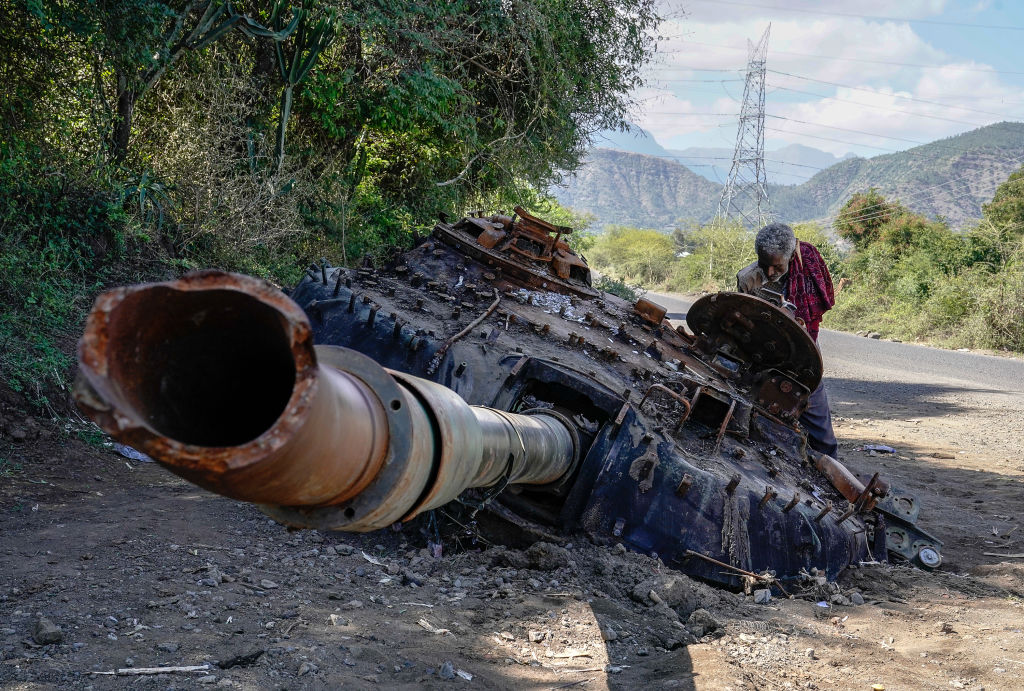ADF STAFF
As 2022 ended, the story of African security was marked by continuing conflicts, coups and the unrest caused by them. Civil war continued to roil Ethiopia, and regional forces continued their battle against jihadist militants in Somalia, the Sahel and northern Mozambique.
Even Ebola reared its head again, this time in Uganda.
Below is a rundown of some of the events and stories that continue to present security challenges across the continent as the year draws to a close.
ETHIOPIA’S CIVIL WAR: After two years of civil war, there was hope of a breakthrough when Tigrayan and government forces signed a peace agreement in Pretoria, South Africa. Under the deal, hostilities will end, and humanitarian supplies will come to Tigray, where millions need food, the Addis Standard reported. Although there is hope that the fragile ceasefire will hold, observers are concerned about the destabilizing presence of Soldiers from neighboring Eritrea. The war has killed about 500,000 and displaced millions.
EASTERN DR CONGO: The fight against an array of rebel groups in the eastern Democratic Republic of the Congo continued through 2022. Armed factions, including the Allied Democratic Forces, the Interahamwe, M23 rebels and dozens of other Congolese groups, have fostered instability in the region for years. Beginning with the deployment of 12,000 East African Community (EAC) soldiers from Burundi, Kenya, South Sudan and Uganda, it is hoped that peace will return to the restive eastern regions of the country in 2023.
RUSSIA-UKRAINE WAR’S EFFECT ON AFRICA: Russia’s invasion of Ukraine has had dire and pervasive economic effects on almost every African nation. Most notably the conflict has hit Somalia particularly hard, as the country relies heavily on food imports, with 90% of its wheat coming from the warring countries, according to Reuters. The war also has contributed to higher fuel and fertilizer costs for farmers across the continent, which also has increased food prices.
COUPS CONTINUE: Burkina Faso carried over a disturbing coup trend from 2021, when in January 2022 the military overthrew President Roch Marc Kaboré and handed control to Lt. Col. Paul-Henri Sandaogo Damiba. In late September, one of Damiba’s junior officers, Capt. Ibrahim Traoré, overthrew him after accusations that Damiba had failed to curb extremist violence. Unsuccessful coup attempts also were made in Guinea-Bissau in February 2022 and in São Tomé and Príncipe in late November 2022.
SAHEL MILITANT VIOLENCE: 2022 was on track to be the worst year for Burkina Faso and Mali regarding violence since instability began in the Sahel in 2012, according to the Armed Conflict Location & Event Data Project. From January to June 2022, the regional crisis worsened. Fatalities in Mali already had surpassed the 2021 total by that point. Violent extremist events in the Sahel have quadrupled since 2019, according to the Africa Center for Strategic Studies.
EBOLA RETURNS: Ebola outbreaks returned to Africa in 2022, first in the DRC and later in Uganda. DRC health officials declared an outbreak on April 23, 2022, in Equateur province, and another on August 21, 2022, in North Kivu province, according to the World Health Organization. Each outbreak ended with minimal transmission. In Uganda, however, a more significant outbreak that started on September 20 had killed 55 as of December 5, and another 22 people who may have had it also died. The Sudan strain caused the outbreak, and it had begun to taper off by early December, according to the website Science.
VIOLENCE IN NORTHERN MOZAMBIQUE: The Southern African Development Community (SADC) Mission in Mozambique (SAMIM) regional force continued to battle insurgents in Mozambique’s Cabo Delgado province as 2022 ended. According to South African news outlet News24, SAMIM Soldiers killed more than 30 insurgents and confiscated weapons, ammunition and equipment in late November. The battle killed two SAMIM troops, one each from Botswana and Tanzania. SAMIM is composed of 2,000 Soldiers from SADC member states. Rwanda also has up to 2,500 troops in the fight, according to News24.
SUDAN COUP PROTESTS CONTINUE: Sudan has been a cauldron of instability since an October 2021 military coup overthrew a transitional government trying to lead the nation out of 30 years of dictatorial rule under Omar al-Bashir. By July 2022, security forces had killed 113 anti-coup protesters, according to a United Nations report, and hundreds more had been arrested. Tens of thousands still dared to demonstrate one year after the coup in Khartoum and elsewhere. Sudanese political parties and the military signed a deal on December 5 to begin a two-year transition toward elections and civilian rule. However, three days later protesters again took to Khartoum’s streets to demand that ruling military officials be ousted, the Sudan Tribune reported. Negotiations were expected to continue.

